
How Male Dogs Adapt to a New Baby: A Helpful Guide
Dogs are deeply social creatures that see their family as their pack. When a new baby joins the household, it represents a big change for your dog, especially for male dogs who often exhibit distinct behaviours during this adjustment period.
Male dogs may initially respond with curiosity, stress, or territorial behaviours as they navigate this new dynamic. Their instinct to protect the pack means they often become particularly watchful of the newborn. As they recognise the baby as part of their family through scent and routine, they usually form a strong protective bond.
Understanding how your male dog experiences the arrival of a baby can help you manage the transition smoothly and foster a safe, loving relationship between them.
1. Territory and Marking
Male dogs tend to be more territorial than females and the arrival of a baby may trigger them to assert control in the home. You might notice your dog patrolling the house or garden and sometimes increased scent marking as they attempt to reassure themselves that their territory is still secure.
Although aggression towards the baby is rare, jealousy and stress can sometimes manifest. It’s paramount to watch for signs of anxiety and keep the baby's hygiene in mind when your dog is around.
2. Protective Instincts
Once your male dog recognises the baby as part of the pack, their natural protective instincts will come to the fore. They may begin to guard the baby or become wary of strangers approaching, which is their way of keeping the vulnerable infant safe.
Be mindful when guests visit or during walks with the baby in a pram. Supervise your dog to prevent any unfriendly behaviour while promoting positive socialisation with visitors.
3. Managing Attention Demands
A new baby changes the family's daily routine and your dog may feel excluded or anxious. Male dogs can become clingy or demanding for attention during these early weeks. It’s essential to continue feeding, walking, and playing with your dog as regularly as possible to reduce stress.
Involving your dog in interactions with your baby—such as talking to both simultaneously or giving your dog affection when the baby is near—helps create positive associations with the baby's presence.
4. Safe Interaction Guidelines
No dog, regardless of temper, should ever be left unsupervised with an infant or young child. Manage interactions carefully and watch for any signs of discomfort or undesirable behaviour.
Allow your dog to sniff and gently get to know the baby, but discourage behaviours like face licking to maintain hygiene and reduce illness risks.
5. Best Practices for Introduction and Ongoing Bonding
To ease the transition for your male dog, consider these tips:
- Prepare in advance: Before bringing baby home, introduce your dog to baby sounds, scents, and equipment so they become familiar gradually.
- Training refresh: Reinforce basic obedience commands like sit, stay, and come to ensure your dog remains manageable around the baby.
- Positive reinforcement: Reward calm and gentle behaviour with treats or praise to encourage good interactions.
- Supervise all interactions: Always have an adult present to ensure safety during dog-baby time.
- Respect your dog’s space: Provide your dog with a quiet area they can retreat to when feeling overwhelmed.
With patience, empathy, and consistent guidance, male dogs can adapt well to the addition of a new baby, often becoming protective and affectionate companions who share a lifelong bond.
Remember, responsible pet ownership means prioritising safety and wellbeing for both your dog and your child as you all adjust to this exciting new chapter.
For finding a puppy or reputable breeders to start your family, visit puppies for sale.



